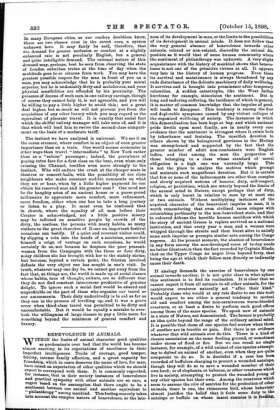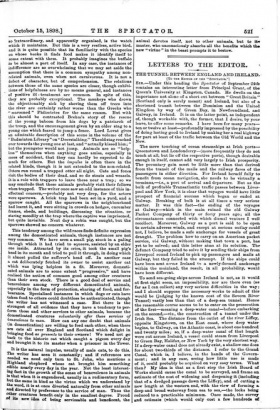BENEVOLENCE IN ANIMALS.
WITHIN the limits of animal character good qualities so predominate over bad that the world has become almost exacting in its expectations of excellence in their imperfect intelligences. Traits of courage, good temper, fidelity, intense family affection, and a great capacity for friendship, which in cases deserves the name of love, for man, have raised an expectation of other qualities which we should expect to correspond with them. It is commonly regretted, for instance, that in their society instances of benevolence and practical sympathy with other animals are so rare, a regret based on the assumption that there ought to be a sentiment between one animal and another equivalent to "philanthropy" among mankind. This feeling scarcely takes into account the complex nature of benevolence, or the late- nese of its development in man, or the limits to the possibilities of its development in animal minds. It does not follow that the very general absence of benevolence towards other animals, related or non-related, discredits the animal die,. position as it would that of some human community where the sentiment of philanthropy was unknown. A very slight acquaintance with the history of mankind shows that benevo- lence is not one of the primitive virtues at all. It appears very late in the history of human progress. Even there its survival and maintenance is always threatened by any rude disturbance of the delicate machinery of daily wellbeing. It survives and is brought into prominence after temporary calamities. A sudden catastrophe, like the West Indian hurricane for example, stimulates the sentiment. But in long and enduring suffering, the incidence of which is general, it is matter of common knowledge that the impulse of good. will tends to disappear. This tendency is among the first and deplorable symptoms caused by any violent collapse of the organised wellbeing of society. The instances in which this demoralisation has been kept at bay, and which national pride dwells upon most fondly, are in nearly every case evidence that the sentiment is strongest where it exists both by inheritance and training. The unselfish devotion to others shown by the beleaguered garrisons in the Mutiny was strengthened and supported by the fact that the greater number of adult non-combatants were English ladies, and that among the men the proportion of those belonging to a class whose standard of moral obligation is a high one was unusually large. This is not the place to analyse the motives which prompt and maintain such magnificent devotion. But it is certain that few or none of the inducements are other than complex and slowly acquired notions of honour, duty, self-respect, religion, or patriotism, which are utterly beyond the limits of the animal mind in Nature, except perhaps that of duty, which is only learnt in relation to man by at most one or two animals. Without multiplying instances of the acquired character of the benevolent impulse in man, it is worth remembering that even civilised races relapse with astonishing pertinacity to the non-benevolent state, and that in cultured Athens the horrible human sacrifices with which the story of ancient Greece is replete survived as a national institution, and that every year a man and a woman were whipped through the streets and then burnt alive to satisfy some such impulse as prompts similar acts among the Congo negroes. At the present moment, the absence of benevolence in any form among the non-developed races of to-day needs no better illustration than the fact recorded by Captain Hinde, that on the Upper Congo no negro lives beyond forty, that being the age at which their fellow-men directly or indirectly cause their death.
If analogy demands the exercise of benevolence by one animal towards another, it is not quite clear in what sphere this sentiment is to find its realisation. It is clear that we cannot expect it from all animals to all other animals, for the carnivorous creatures naturally act "after their kind." Probably those who would at any rate desire to see this trait would expect to see either a general tendency to mutual aid and comfort among the non-carnivorous warm-blooded creatures, or at least a desire to perform such good offices among those of the same species. We speak now of animals in a state of Nature, not domesticated. The former is probably an idea quite beyond the range of the ordinary animal mind. It is possible that those of one species feel sorrow when those of another are in trouble or pain. But there is no evidence whatever that wild animals ever do this. There is a kind of chance association on the same feeding ground, or sometiame under stress of flood or fire. But we can recall no single instance, for example, of a wild animal of one species attempt- ing to defend an animal of another, even when they are quite competent to do so. It is doubtful if a ease has been recorded of buffaloes charging to protect a wounded antelope, though they will do so to save a wounded member of their own herd ; or of elephants, or baboons, or other creatures which live in society, attempting to protect the wounded young of any other species but their own. Among the creatures which seem to assume the role of sentries for the protection of other animals, there is one, the rhinoceros bird, whose behaviour almost justifies the belief that it feels some duty to the antelope or buffalo on whose insect enemies it is feeding,
so 'extraordinary, and apparently organised, is the watch which it maintains. But this is a very restless, active bird, and it is quite possible that its familiarity with the species on whose backs it finds food makes it identify itself to some extent with them. It probably imagines the buffalo to be almost a. part of itself. In any ease, the instances of indifference are so overwhelming that we may set aside the assumption that there is a common sympathy among non- related animals, even when not carnivorous. It is not a defect of character, but of comprehension. The relations between those of the same species are closer, though exhibi- tions of helpfulness are by no means general, and instances of positive ill,treatment are common. In spite of this, they are -probably exceptional. The monkeys who drown the objectionably sick by shoving them off trees into the river are certainly rather worse than the Greeks who ."
marooned" Philoctetes for the same reason. But with this should be contrasted Brehm's story of the rescue of the young baboon from his dogs by a patriarch of the troop, and the encouragement given by an older stag to a young one which feared to jump a fence. Lord Lovat gives an admirable description of this scene in the volume of the "Badminton Library " on " D eerstal kin g." The old stag reached over towards the young one at last, and "actually kissed him;" but the youngster would not jump. Animals are so "help- less" themselves when anything goes amiss, especially in eases of accident, that they can hardly be expected to do much for others. But the impulse is often there in the related kinds, though it is not extended to the non-related. Otters run round a trapped otter all night. Cats and foxes visit the bodies of their dead, and so do stoats and weasels. It is a rule with trappers to leave these near a trap ; so we may conclude that these animals probably visit their fellows when trapped. The writer once saw an odd instance of this in- effectual concern,—probably not very deep, for the actors were sparrows. A brick trap had been set in a yard, and a sparrow caught. All the sparrows in the neighbourhood had learnt it, and were sitting in crowds on hedges, cucumber frames, sheds, and buildings, discussing the situation, or staring moodily at the trap where the captive was imprisoned, but quite invisible. Next day a robin was caught, but the sparrows showed no concern whatever.
This tendency among the wild races finds definite expression among the domesticated animals, though instances are not very common. We have seen a small pig, stuck in a paling through which it had tried to squeeze, assisted by an elder one inside. Attracted by its cries, it took the small pig's head in its month and tried to pull it through, in doing which it almost pulled the sufferer's head off. In another case a cat deliberately fetched its owner to assist another cat which was lying helpless in a fit. Moreover, domesti- rated animals are to some extent "progressive," and have realised the notion of common good among other creatures than their own stock. There is a good deal of service and benevolence among very different domesticated animals, especially in the form of protection, sharing of food, and for- bearance. Specialised instances in which dogs or cats have taken food to others could doubtless be authenticated, though the writer has not witnessed a case. But there is the strongest of all evidence that they have a tendency to per- form these and other services to other animals, because the domesticated creatures voluntarily ofer these services of benevolence to man. How can any one doubt that animals '(111 domestication) are willing to feed each other, when there are cats all over England and Scotland which delight in bringing food as presents to their owners ! We need not go hack to the historic eat which caught a pigeon every day and brought it to its master when a prisoner in the Tower.
It is the natural impulse, usually of male cats, to do this. The writer has seen it constantly ; and if references are needed we need only turn to St. John, who mentions a Highland shepherd whose cat brought him something edible nearly every day in the year. Not the least interest- ing fact in the growth of the sense of benevolence in animals is that when it is engendered, usually in a rudimentary form, but the same in kind as the virtue which we understand by the word, it is at once diverted naturally from other animals and directed by preference to the service of man. Thus the other creatures benefit only in the smallest degree. Proud et its new idea of being serviceable and beneficent, the animal devotes itself, not to other animals, but to it* master, who unconsciously absorbs all the benefits which the new "virtue" in the beast prompts it to bestow.







































 Previous page
Previous page